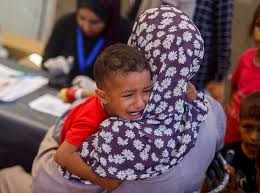
F.P. Report
Washington, D.C: Secretary Antony J. Blinken has said that every day, thousands of American diplomats and development experts dedicate themselves to advancing the interests and representing the values of the American people.
Their service often comes with risk – both for our Foreign and Civil Service officers, and also at times for the loved ones who accompany them to posts around the world.
And just as they work hard for us, we have to do all we can to protect their health, their safety, their security.
That’s certainly the case when it comes to addressing the threat posed by Anomalous Health Incidents.
These incidents have left our colleagues with profound harm.
They’ve experienced serious physical consequences, including persistent headaches and hearing loss.
They’ve also experienced psychological harm, including trauma, anxiety, depression.
They’ve been affected, their careers have been affected, their families and colleagues have been affected, too.
And all of us in the U.S. Government – and especially we at the State Department – are intently focused on getting to the bottom of what and who is causing these incidents, caring for those who have been affected, and protecting our people.
Even before being sworn in as Secretary, I asked to be fully briefed by the previous administration on what they knew about these Anomalous Health Incidents and what they had done to address them, because this was an issue that we wanted to tackle starting on day one.
Let me speak to some of the ways the State Department has been doing that.
First, we’re ensuring that every employee and family member affected by these incidents gets the medical care and other assistance they might need.
I’m very pleased to share that we recently appointed Ambassador Margaret Uyehara to serve as our senior care coordinator.
A career member of the Foreign Service with three decades of experience at the State Department, she has already gotten to work advocating for those affected, including assisting them with workers’ compensation and the benefits process.
She’s compassionate; she’s effective. We’re grateful for her and her commitment to this vital issue.
Additionally, last month, the State Department began a partnership with Johns Hopkins University to expand the top-tier care available to employees and families who have been affected by Anomalous Health Incidents.
Now they can access the university’s outstanding medical professionals and facilities as well.
Second, we heard from our workforce that they want more information about these incidents.
So we’ve stepped up our communications.
I’m engaging regularly with employees through town halls, messages to our workforce, visits to embassies, and other forums to share what we’ve learning and what we’re doing, and especially to hear directly from our people.
Other senior leaders are doing the same.
Across all of these meetings, we’re emphasizing the same message over and over, because it’s so important. There is absolutely no stigma in reporting these incidents, and there will, of course, be no negative consequences of any kind.
On the contrary, reporting means that we can get people the help they need.
And by reporting, you can help keep others safe – and help us get to the bottom of who and what is responsible.
In every embassy and consulate, Diplomatic Security and Medical Services staff have been instructed to take seriously every report of an Anomalous Health Incident, to follow standard guidance in responding to them, and to report them up the chain.
We’ve also made sure that employees and leaders know how to report these incidents.
And in May, we set up a dedicated channel for employees or family members who can – if they choose – send questions anonymously about these health incidents and receive prompt answers.
Communication runs in both directions.
We aren’t only talking; we’re also listening.
That includes regularly meeting with individuals affected by Anomalous Health Incidents.
And I’m profoundly grateful to those employees and their loved ones for being willing to share their experiences, as painful as they may be, and for giving us their honest and forthright opinions about how we can better be there for them and others in this difficult situation.
Third, we’re making sure that every member of our workforce is empowered with the information to help identify and prevent these incidents.
As you may know, the State Department created our Health Incidents Response Task Force in 2018 to run point on this challenge.
Its mandate is to help ensure care for all U.S. personnel and dependents under chief of mission responsibility, strengthening mitigation and prevention, and improving coordination and cooperation across U.S. Government agencies.
Since the summer, overseas employees and spouses at posts worldwide have received information on Anomalous Health Incidents during their initial security briefings.
And the Health Incidents Response Task Force has been working with the Foreign Service Institute to develop a training module on these incidents, which will be included in the standard Security Overseas Seminar for employees and family members starting soon.
Fourth, we’re constantly improving our assessment tools so we can better identify, understand, and respond to these incidents.
We continue to draw on the expertise of the team that our Bureau of Medical Services assembled to respond to reports of possible incidents.
We developed the clinical triage tool that standardizes the medical assessments of these incidents for individuals across affected agencies, and in June we updated it.
That same month, we launched a pilot program to collect baseline health information here in Washington from employees and eligible family members.
We’re capturing people’s neurological, cognitive, ocular, auditory, and vestibular data so we have a point of reference and comparison if they later report an Anomalous Health Incident.
I spent some time yesterday at the Medical Command Center. I was very impressed by the rigor, the professionalism, the empathy that our colleagues are bringing to this challenge.
We’ve also deployed teams of security specialists and occupational safety experts to inspect the locations where incidents have been reported.
We’re feeding all of the information we gather into a whole-of-government effort aimed at determining what is behind these incidents.
And that’s my fifth point: We’re working tirelessly with partners across the government to identify what is causing these incidents and to learn who is responsible.
This is an urgent priority for President Biden, for me, for our entire government.
And we will do absolutely everything we can – leaving no stone unturned – to stop these occurrences as swiftly as possible.
And while I can’t go into all the ways we’re doing that, I want to assure you that we’re pursuing every possible lead and sparing no resources, including when it comes to protecting personnel around the world.
We’re drawing on the full capacity of our Intelligence Community; we’re enlisting the best scientific minds inside and outside of government.
We’re also very fortunate to have Congress as a partner in this.
Their attention and leadership on this issue has been vital.
For example, they recently enacted the Havana Act, which provides an additional benefit to federal employees who have suffered serious harm from these incidents.
Sixth, we’re developing, obtaining, and deploying technology to the field to protect our personnel.
The details I can provide on this are limited as well, but I can say that new technology is helping us more quickly and thoroughly evaluate a variety of potential causes of these incidents, and we’ve distributed it across posts so that we can respond rapidly to new reports.
Finally, I’m pleased to announce the new head of our Health Incident Response Task Force: Ambassador Jonathan Moore.
Jonathan brings decades of experience grappling with complex policy challenges.
His career in the Foreign Service has taken him from posts around the globe, from Bosnia to Namibia, and he’s managed portfolios ranging from Russia policy to engagement with the United Nations.
Across each of his assignments, Jonathan has brought a strong analytical capacity and fidelity to the facts.
He knows the State Department.
He knows the inter-agency process.
And he cares about the people he works with, which is particularly important for this assignment, for which treating people with empathy and decency is absolutely key.
And I know we can count on Jonathan and Margaret – who will be working together closely – to do just that.
I’m looking to them both to keep me and our senior leadership team fully informed of our progress, including in areas where we can do more.
Margaret and Jonathan will speak here today about the work they and their teams will do on this critical issue.
Before I turn it over to them, one final point.
The strength of the State Department, like every institution, comes down to our people.
If we want the State Department to be as strong as it can be and the most effective advocate for our interests and values around the world, we have to take care of the people who serve here.
That’s our most important duty.
That’s my most important responsibility.
And we will be vigorous and steadfast in fulfilling it.
The post Secretary Antony J. Blinken on the Department’s Health Incidents Response Task Force appeared first on The Frontier Post.






